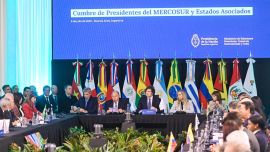Argentina's lower house has resumed debate on President Javier Milei's reform package known as the 'omnibus law,' with lawmakers preparing to vote "article by article" on the government's sweeping reforms.
Last week, after three marathon sessions, lawmakers in the Chamber of Deputies approved "in general" the bill – known formally as the 'Ley de Bases y Puntos de Partida para La Libertad de los Argentinos' – but agreed to tackle it line-by-line in subsequent sessions.
The bill, which originally contained 664 articles, has already been slashed to around half its size during negotiations to secure its approval.
The "article-by-article" treatment of the bill began with a presentation by opposition deputies about the "police repression" of protests in front of Congress during the previous sessions, Demonstrators were arrested and left with injuries, including at least 20 journalists and photographers.
"Where do they want them to protest, if they were in front of Congress? There are going to be more demonstrations," warned left-wing deputy Nicolás del Caño, who criticised the new hard-line "anti-picket protocol" introduced by Security Minister Patricia Bullrich, which prevents protesters from blocking roads.
First step
Milei's ruling La Libertad Avanza party, with only 38 of 257 deputies, took the first step on Friday when it secured the support of centre-right allies for the remaining articles of the Omnibus Law. The bill includes ultra-liberal economic and a strong fiscal adjustment. The government wants to reduce Argentina's public deficit by five percent of GDP this year.
All eyes now are on the sticking points: which passages will now be eliminated or modified in the "article-by-article" vote?
Deputies must approve or reject a number of controversial reforms – such as the declaration of a national emergency and fierce cuts in public funding for science and culture – which were also opposed by several opposition blocs.
During negotiations, the government also removed the bill's fiscal chapter, which tackled subjects like a tax amnesty whitewash, agricultural duties and money-laundering regulations.
Milei's party continued negotiating changes up until the last moment. Governors of several provinces and deputies responded politically, and demanded flexibility on federal revenue-sharing funds to finance current expenses.
Other resisted points included the granting of emergency “delegated powers” to Milei for one year or more, which would allow him to govern by decree and look subsequently for parliamentary approval.
Another key topic is the privatisation of some 40 public companies., including state media outlets, public transportation companies and national flagship firms like Aerolíneas Argentinas and Correo Argentino.
After the 'Ley de Bases' obtains full approval, it will move to the Senate, where Milei’s party holds only eight of 72 total seats.
The president's reform package is complemented by a 366-article emergency Decree of Necessity and Urgency (DNU), which was issued to repeal or reform hundreds of economic regulations. The president’s goal is to liberalise Argentina's economy as much as possible.
Milei’s administration devalued the peso by more than 50 percent upon taking office and removed all price controls in December. Monthly inflation climbed to 25.5% and the year closed out at 211 percent annually.
This Tuesday, the government also announced a 250 percent increase in bus and train fares in the Buenos Aires metropolitan area, with the intention of bringing prices in line with other provinces nationwide.
– TIMES/AFP


























Comments